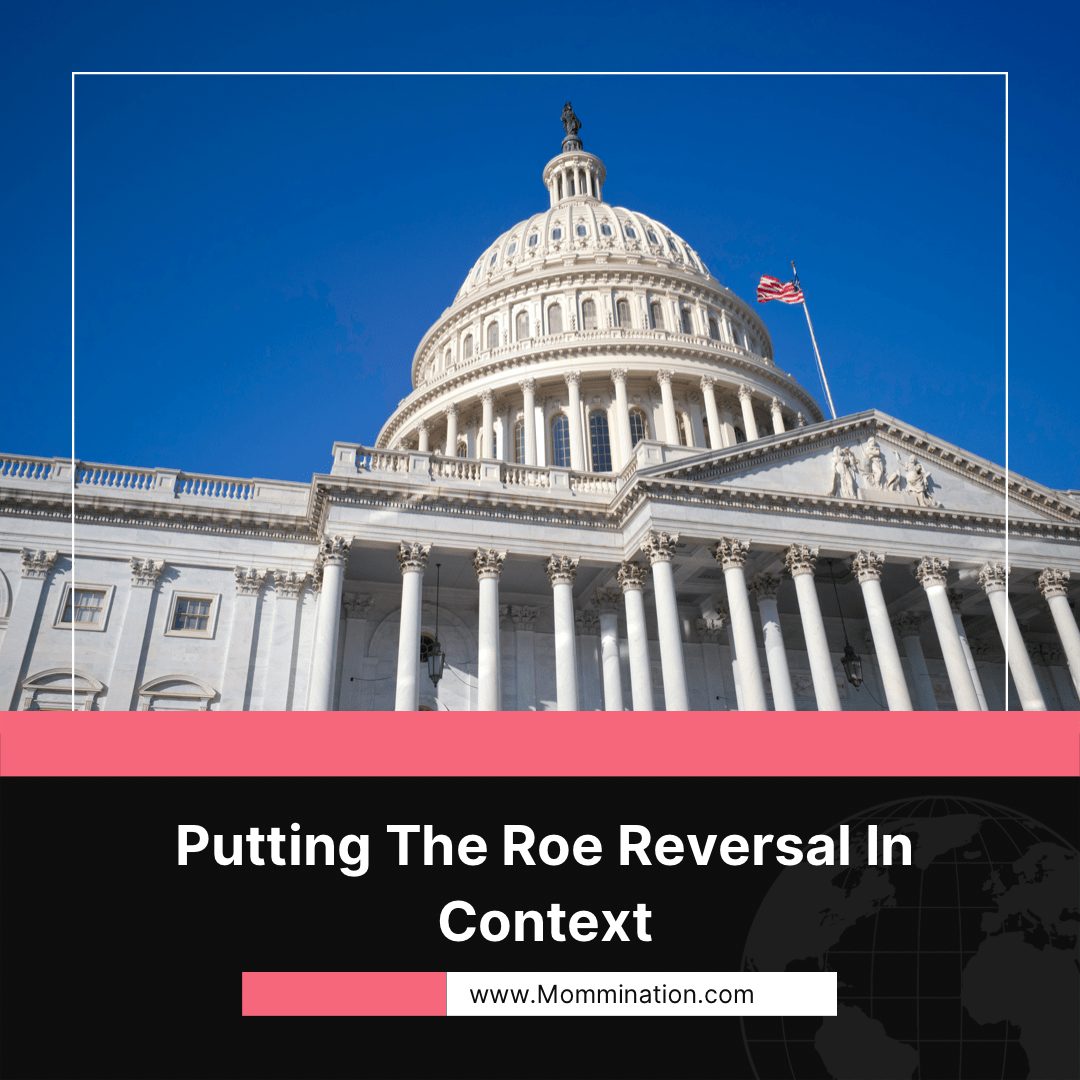PUTTING THE ROE REVERSAL IN CONTEXT
MommiNation talks with lawyer and political scientist, Dr. Nikol Alexander-Floyd about how to put the Roe reversal in context.
MommiNation: The logic that the court used in overturning Roe was that the original Roe decision was just wrongly decided. How do we make sense of that argument?
Dr. Alexander-Floyd: There are different schools of thought about how we ought to understand our Constitution. People who are “originaists” are focused on the question: “what did our founders intend?” They present themselves as protecting the vision of the development of our country as represented by the founding fathers. And so they ask questions like, “literally, what does the Constitution say?” And “what did the Founding Fathers intend?” So, they argue that when you read the US Constitution, or if you look through any of the amendments, we don’t see the word ‘abortion’ mentioned. We know that there were abortions even in the time in which the Constitution was developed. It is just not mentioned in the Constitution.
But, others like the late Supreme Court Justice Thurgood Marshall talked about the Constitution as a ‘living document.’ He talked about a living Constitution. If we looked at the Constitution, at the country’s founding, only White men with property really had rights as we understand them. We have amendments that have been put into place to clarify certain rights. And, so another kind of approach to thinking about how to interpret the Constitution takes into account a range of factors, including not only the letter, but the spirit, of the law. That’s spirit of the law approach is how Justice Douglas, in the Griswold v Connecticut decision, looked at a variety of different amendments and connected them the right of privacy. That decision is rooted in the idea that the right to privacy is something that’s implied. The decision in Roe was based on an interpretive paradigm that saw the Constitution as a living document and understood the need to assess real life problems in light of not only the letter but the spirit of law, and in terms of the values that are implied in our Constitution, its amendments, and in the case law around it. That interpretative approach is something that people like Justice Thomas have really fought against. So, in many ways it boils down to the approach to how we analyze this document.
MommiNation: You and others argue that this is not exclusively an issue of approaches to analyzing the Constitution. What do you mean?
Dr. Alexander-Floyd: It really becomes a way of justifying what people want to see happen in terms of power. Roe v. Wade wasn’t something that was wrongly decided. Brown v Board of Education wasn’t wrongly decided. Brett Kavanaugh, Amy Barrett, people were asked questions very directly about Roe v. Wade, and they lied under oath, or made statements that gave the impression that they would not overturn Roe. And they did that at first opportunity. This is possible because of power. Because they have the power to do it. It’s not really about the legal arguments. The bottom line is that conservatives worked actively for decades to develop a conservative court, and they were successful. And Democrats did not put in place laws that would further codify the right to an abortion. When they had opportunity, they did not overturn the Hyde Amendment. For women living in poverty, the Hyde Amendment has been critical. For women who receive Medicaid, The Hyde Amendment restricts abortions to only those cases where it is necessary to save the life of the mother. So, if you were pregnant by rape, or pregnant by incest, then you cannot have an abortion paid for by Medicaid. And so, we have a lot to a lot to account for in terms of how we’ve come to this moment.
MommiNation: What are the implications of the argument that the case had to be overturned because it was wrongly decided?
Dr. Alexander-Floyd: If that same kind of argument is made specifically in relation to the 14th Amendment in terms of substantive due process, there are a whole lot of rights that we take for granted right now that are going to be in jeopardy. The 14th amendment is one of three civil rights amendments, the 13th 14th and 15th. The 14th amendment has come to establish rights that every person in the United States benefit from. Procedural due process comes from the 14th Amendment. This amendment gives people the right to notice and an opportunity to be heard when there’s any kind of potential for loss of property or constraint on your life. So, if you have an employment action from your employer, you’d have notice and an opportunity to be heard in appeal.
MommiNation: How do we put this decision in context?
Dr: Alexander-Floyd: Anti-abortion activism hasn’t happened in secret. It’s happened in the plain light of day, for decades. What has made this possible, of course, is the conservative majority in the Supreme Court now, that was made possible by a president that is an insurrectionist. This decision is important in of itself, for what it communicates, and what it lays out in terms of access to reproductive options, but it also signals a moment of crisis in terms of the United States as a democracy. We have a sitting Justice, Clarence Thomas, who, in the same Supreme Court season, has written a decision for the court that basically says that states can’t restrict gun access. Think about that. This is a man who is married to a woman, Ginny Thomas, who is directly involved in an attempt to overthrow the United States government. He argued that no state can have restrictions on gun access unless they can show that, at the time of instituting the Second Amendment or the 14th Amendment, states had particular restrictions that were popular at the time. That’s absurd! We won’t trust states to regulate guns, but will trust states to regulate abortion? That reasoning really opens up a space to overturn cases like Griswold versus Connecticut, and other cases that are the foundation for same sex marriage, and even civil rights. In fact, there was a sitting US senator from the state of Texas, John Cornyn, who tweeted, in response to a tweet by President Barack Obama, that “now let’s do Plessy versus Ferguson and Brown v Board of Ed.”
MommiNation: A number of people have argued that this decision has to be viewed, in part, through the lens of race. What are your thoughts?
Dr. Alexander-Floyd: One of the key things that we have to understand is that the anti-abortion movement, the quote unquote, Pro-life movement, really is not about simply about a deracialized understanding of reproductive rights or reproductive capacity. It is intensely racialized. Part of what the fight to end abortion deals with are nationalistic fears that people have about the changing demographics of our country.
This Dobbs decision overturning Roe is consequential in its own right, but it signals a very serious state of affairs. There’s a congresswoman, Mary Miller, who said in a Trump rally that this overturning of Roe was a victory for “White life.” That’s just a very basic representation of what this has meant in terms of White nationalism and the fear of a Black Planet. The fear of a brown planet. The fear some people have about the growing diversity in this country. [Trump] has driven the attack on family welfare policy and rollbacks in resources and policies in support the public good. He has supported anti-immigration policy. These are absolutely connected to the push for the overturning of Roe v. Wade.
MommiNation: Are there other consequences of this decision that people should be tracking?
Dr. Alexander-Floyd: The overturning of Roe is a bellwether event, and we’re going to see the repercussions especially for Black women because we are disproportionately represented in the populations of those states that have laws in place that are restrictive of abortion. Prior to this decision, there were states that had trigger laws set up in place, so that if Roe were ever overturned, then those laws would come into effect. So, we are going to see a kind of potpourri of laws in places like New Jersey, Mississippi, Texas, and elsewhere. We’re going to see an increase in the number of unwanted pregnancies, and pregnancies that threaten people’s lives and people are going to die because of this decision.
Roe v. Wade was an important decision, in general, and it is especially so for Black women and other women of color. One of the critical things we know is that the rate of abortions among Black women is five times higher than the rate for White women. This is true for a range of reasons. Black women–Black people– are disproportionately represented amongst the uninsured. As Christine Slaughter and Chelsea Jones point out (https://www.washingtonpost.com/politics/2022/06/25/dobbs-roe-black-racism-disparate-maternal-health/
), more than 14% of Black women are uninsured compared to their White counterparts. Moreover, one in four Black women are covered by Medicaid. We are also disproportionately represented in the states where abortion access is going to be constricted. To give you one example, Mississippi, which is the subject of the Dobbs decision, there is only one abortion center in the state of Mississippi, but about 37% of the state is Black. So, demographically speaking, that’s significant. So, making abortions illegal is really a crisis for Black communities, and it needs to be read in that way by political organizations.
MommiNation: A number of corporations have stated that they are joining the fight for women’s right to choose. What are your thoughts about that?
Dr. Alexander-Floyd: It’s great that companies like Starbucks or Dick’s Sporting Goods are seeking to provide funds so people can have access to reproductive rights. But the bottom line is that there’s only so much that self-help will do. There’s only so much that corporate or NGO efforts can do. We need access to the power of the state to defend and provide for the public good. We have got to position legislators who have the guts and the commitment to protect reproductive justice, and they have to be forced to do that.
MommiNation: For people who support a woman’s right to choose, what are the options? What can the average citizen do to push back against this decision?
Dr: Alexander-Floyd: Well, that’s the million-dollar question. In the short-term we are going to have to help people to travel to jurisdictions where abortion is accessible. But that is just a short-term solution. Long-term there’s a need to develop legislation that makes abortion on-demand accessible in every state. That will take political will. That will have to be asserted through elected officials. But they will only do what they are pushed to do, so voting is critically important. It is just as important, to a certain extent more so, that we hit the streets. This is a time when we need mass demonstrations. It is time for mass mobilization. We will have the society that we advocate for. We have to leverage our power. Most Americans already support the right to safe abortions. With so much going on in the world you often hear people say that they are exhausted. We hear this even from people who are highly educated and politically committed. People are saturated to a certain point. Some folks also aren’t watching the public hearings on the January 6 coup attempt. But this discussion around reproductive justice is critically important.
Bio:

(photo courtesy of: https://polisci.rutgers.edu/people/department-directory/details/1701-nikolalexander-floyd)
Nikol G. Alexander-Floyd, J.D., Ph.D., is Professor of Political Science at Rutgers University-New Brunswick. Dr. Alexander-Floyd is a legal theorist and activist who teaches courses and conducts research on race and ethnic politics, women in politics, and law. She is co-founder of the Association for the Study of Black women in Politics.








Leave a Reply